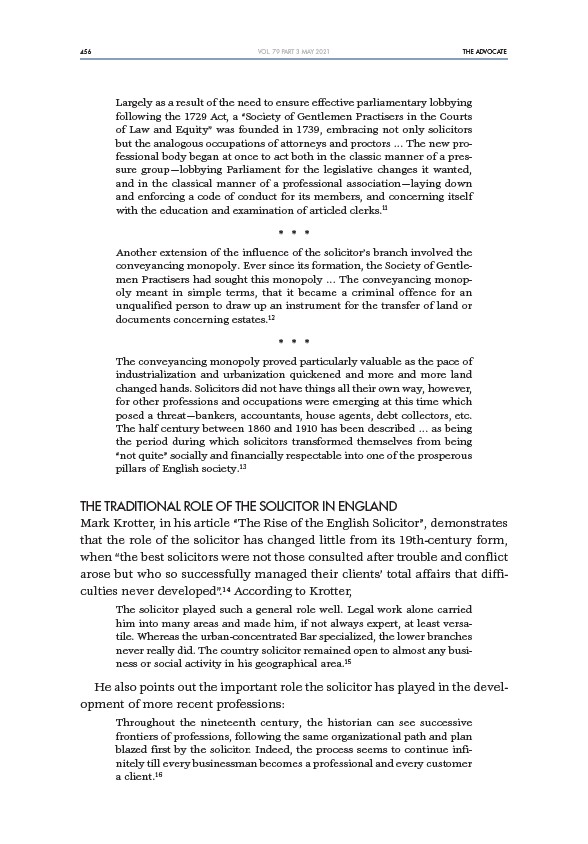
456 THE ADVOCATE
VOL. 79 PART 3 MAY 2021
Largely as a result of the need to ensure effective parliamentary lobbying
following the 1729 Act, a “Society of Gentlemen Practisers in the Courts
of Law and Equity” was founded in 1739, embracing not only solicitors
but the analogous occupations of attorneys and proctors … The new professional
body began at once to act both in the classic manner of a pressure
group—lobbying Parliament for the legislative changes it wanted,
and in the classical manner of a professional association—laying down
and enforcing a code of conduct for its members, and concerning itself
with the education and examination of articled clerks.11
* * *
Another extension of the influence of the solicitor’s branch involved the
conveyancing monopoly. Ever since its formation, the Society of Gentlemen
Practisers had sought this monopoly … The conveyancing monopoly
meant in simple terms, that it became a criminal offence for an
unqualified person to draw up an instrument for the transfer of land or
documents concerning estates.12
* * *
The conveyancing monopoly proved particularly valuable as the pace of
industrialization and urbanization quickened and more and more land
changed hands. Solicitors did not have things all their own way, however,
for other professions and occupations were emerging at this time which
posed a threat—bankers, accountants, house agents, debt collectors, etc.
The half century between 1860 and 1910 has been described … as being
the period during which solicitors transformed themselves from being
“not quite” socially and financially respectable into one of the prosperous
pillars of English society.13
THE TRADITIONAL ROLE OF THE SOLICITOR IN ENGLAND
Mark Krotter, in his article “The Rise of the English Solicitor”, demonstrates
that the role of the solicitor has changed little from its 19th-century form,
when “the best solicitors were not those consulted after trouble and conflict
arose but who so successfully managed their clients’ total affairs that difficulties
never developed”.14 According to Krotter,
The solicitor played such a general role well. Legal work alone carried
him into many areas and made him, if not always expert, at least versatile.
Whereas the urban-concentrated Bar specialized, the lower branches
never really did. The country solicitor remained open to almost any business
or social activity in his geographical area.15
He also points out the important role the solicitor has played in the development
of more recent professions:
Throughout the nineteenth century, the historian can see successive
frontiers of professions, following the same organizational path and plan
blazed first by the solicitor. Indeed, the process seems to continue infinitely
till every businessman becomes a professional and every customer
a client.16